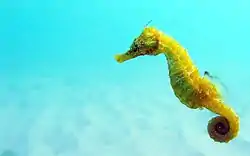海馬
See also: 海马
Chinese
| ocean; sea | horse; surname | ||
|---|---|---|---|
| trad. (海馬) | 海 | 馬 | |
| simp. (海马) | 海 | 马 | |
Etymology
- sea horse
- So named as its shape is similar to horse's head. First used in the Tang dynasty-era 《本草拾遺》 (Supplements to the Compendium of Materia Medica).
Pronunciation
Japanese
Etymology 1

海馬 (umiuma, kaiba): a sea horse.
| Kanji in this term | |
|---|---|
| 海 | 馬 |
| うみ Grade: 2 |
うま Grade: 2 |
| kun’yomi | |
Compound of 海 (umi, “ocean, sea”) + 馬 (uma, “horse”).[1][2]
Pronunciation
Etymology 2

海馬 (kaiba): a walrus.
| Kanji in this term | |
|---|---|
| 海 | 馬 |
| かい Grade: 2 |
ば Grade: 2 |
| on’yomi | |
From Middle Chinese 海馬 (xojX mæX, literally “sea + horse”). Compare Mandarin 海馬 (hǎimǎ), Cantonese 海馬 (hoi2 maa5), Min Nan 海馬 (hái-bé).
Noun
Synonyms
- (hippocampus): 海馬体 (kaibatai)
Etymology 3
_on_rocks.jpg.webp)
海馬 (todo): a female and male Steller sea lion.
| Kanji in this term | |
|---|---|
| 海 | 馬 |
| Grade: 2 | Grade: 2 |
| Irregular | |
From Ainu トド (todo), トト (toto, “sea lion”).[1] The kanji is jukujikun (熟字訓).
Alternative forms
Usage notes
As with many terms that name organisms, this term is often spelled in katakana, especially in biological contexts, as トド. The kanji spellings are rare. When written in kanji, the 胡獱 spelling may be more common, likely to avoid confusion with the alternate readings of the 海馬 spelling of umiuma and kaiba.
References
- 1988, 国語大辞典(新装版) (Kokugo Dai Jiten, Revised Edition) (in Japanese), Tōkyō: Shogakukan
- 2006, 大辞林 (Daijirin), Third Edition (in Japanese), Tōkyō: Sanseidō, →ISBN
This article is issued from Wiktionary. The text is licensed under Creative Commons - Attribution - Sharealike. Additional terms may apply for the media files.